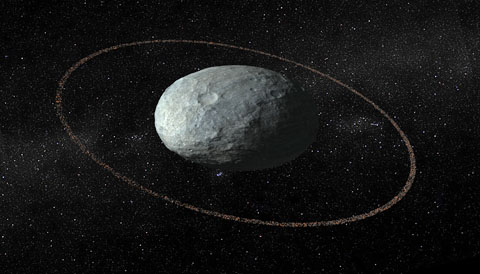Meet Haumea, a dwarf planet hanging out in the Kuiper Belt, a chilly zone beyond Neptune. Discovered in 2004, it got its name from a Hawaiian goddess, and it's not your run-of-the-mill space rock.

What makes Haumea a cosmic oddball? Well, for starters, it spins like a top. Every four hours, it completes a full rotation, causing it to stretch and flatten into a cigar-like shape. This spinny action sets Haumea apart from its more spherical neighbors.
Adding to its allure, Haumea's surface is coated in a shiny layer of icy stuff, making it quite the reflective character in our cosmic neighborhood. But here's the plot twist – in 2017, astronomers picked up signs of a faint ring system around Haumea. Yes, you read that right – a ring system. This finding adds an extra layer of intrigue to this small, peculiar planet.
Not just a loner, Haumea has two moons, Hi'iaka and Namaka, born from a past celestial collision. Together with its unique shape and newfound ring system, Haumea is like the rebel of the Kuiper Belt.


What makes Haumea a cosmic oddball? Well, for starters, it spins like a top. Every four hours, it completes a full rotation, causing it to stretch and flatten into a cigar-like shape. This spinny action sets Haumea apart from its more spherical neighbors.
Adding to its allure, Haumea's surface is coated in a shiny layer of icy stuff, making it quite the reflective character in our cosmic neighborhood. But here's the plot twist – in 2017, astronomers picked up signs of a faint ring system around Haumea. Yes, you read that right – a ring system. This finding adds an extra layer of intrigue to this small, peculiar planet.
Not just a loner, Haumea has two moons, Hi'iaka and Namaka, born from a past celestial collision. Together with its unique shape and newfound ring system, Haumea is like the rebel of the Kuiper Belt.



